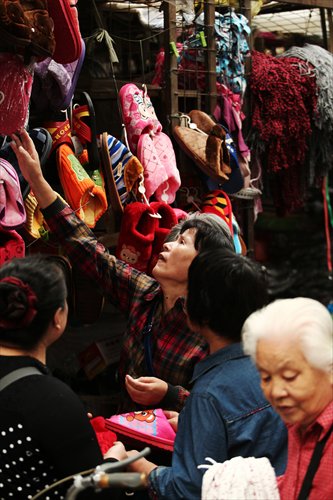

Local residents have been frequenting the Sihuan Market for the last 15 years for their groceries and everyday goods. Photo: Cui Meng /GT
As the market enters its final week of operation, she is expecting that her life will have to undergo drastic changes.
Until recently, Jia's 9-year-old son lived with her in Beijing, having grown up spending his afternoon and evening hours away from school in the market with his mother. But with the market's impending demise, Jia is uncertain about her prospects of continuing to provide for her son, and has sent him back to live with relatives in Guang'an.
"He used to go to school nearby [the market], but I don't know where I'll live after the market is gone, and I don't know how I will support him," said Jia. "So it's better for him to go back to our hometown."
Putting bread on the table
A 49-year-old woman surnamed Chen, the owner of a stall called Pingping Bakery, tries to lull her 7-month-old grandson to sleep amidst the clamor of the street market.
Originally from Luzhou, Sichuan Province, she has had her bakery since the first day the market opened, 15 years ago. She has witnessed its many changes: customers new and old, slowly familiarizing themselves with its labyrinthine clutter; laowai awkwardly navigating their way through the stalls to try to get a glimpse of a way of life soon to be erased.
Her humble bakery, which regulars swear makes the best cream buns in the district, has been her source of livelihood, helping her raise her four children to adult age, to the point where they now have children of their own.
Chen has no idea what she is going to do after the market is gone.
"We haven't found a lease elsewhere yet. All the street markets seem to be facing the same fate of being torn down," she said.
Chen does not think she will be able to find another place where the rent is so affordable, or that is as well frequented.
"None of the vendors here want to see it disappear," she said.
The end of an era
The end for the Sihuan Market has already begun.
Since September 18, trade at the market has been restricted to the morning hours of 7 am to 11 am, meaning that vendors can no longer operate during the evening hours.
Although authorities have set up 15 smaller grocery markets in the neighborhood to try to fill the void, there are many who think it cannot adequately be replaced.
"The market is more than a place to shop," said folk culture expert Gao Wei. "It is a space for people to talk about domestic trifles and to socialize. Destroying it removes an essential part of the local culture."
"If we don't protect this local culture, how can Beijing still be called Beijing?" Gao continued. "The charm of the city is embodied in this culture."
Guo Haoxian, who has worked in the administration of the Sihuan Market for more than a decade, said he couldn't understand why the market had to go.
"I think they should revamp the market rather than tearing it down," he said. "Do we really expect the grandmas and grandpas in this area to go to a foreign supermarket on the ground floor of a mall for their groceries?"
How forced move decimated book market
2014-09-11Antique market faces demolition in Shanghai
2014-09-04Italian style street in Tianjin
2014-09-16‘Bumblebee‘ begs money on street
2014-07-31Copyright ©1999-2018
Chinanews.com. All rights reserved.
Reproduction in whole or in part without permission is prohibited.